by Leslie Layton
Darrisha Daniel attended the police brutality protest at City Plaza Friday for a simple reason: She believes policing in this country needs a “whole overhaul.”
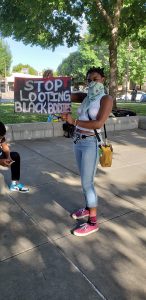
Daniel, an African American psychology major who recently transferred to Chico State, says too many blacks get caught up in “routine” traffic stops and end up “arrested or even dead for no cause.”
“These days it becomes a question as to, who are they protecting and who are they serving?” Daniel said of police. Law enforcement, she noted, swallows up huge chunks of local budgets and government should ensure that “people in those uniforms are there to protect the community.”
Frustration over racial profiling, senseless killings, and the expense of maintaining police departments that are tasked with managing social problems emerged at City Plaza Friday.
Between 1,000 and 2,000 people gathered, joining nationwide protests that followed the police killing of George Floyd in Minneapolis. The Chico rally was peaceful, diverse and family-friendly, but frustration surfaced in “Defund police” signs and “Justice for Desmond” chants that interrupted an address by Mayor Ann Schwab.
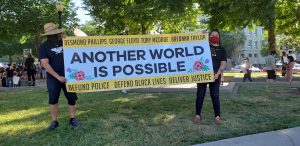
Butte County has seen six law enforcement killings since the death of Desmond Phillips, a 25-year-old black and Miwok Native man, at the hands of Chico police in March 2017. Phillips was in mental crisis and his father had called 9-1-1 for help. The group Justice for Desmond continues to push for the firing of the officers who shot Phillips.
Advocates of police divestment argue that funding could be diverted to mental and public health services — the kind of services that might have kept Phillips alive. The defund police movement has suddenly become a mainstream news story and national discussion as activists push to divert police funding to social services. That debate has made its way to Chico as the City Council prepares to adopt a preliminary spending plan today that allocates almost half of the budget to the Chico Police Department.
In cities like Minneapolis – which has promised to replace its police department with a new public-safety model – police reform failed to achieve the kind of transformation that would prevent the May 25 killing of George Floyd. In Camden, N.J., the police department was disbanded and replaced with a new approach. And what happened? Crime went down.
Vice mayor: “A place to start”
Vice Mayor Alex Brown will also ask the Council this evening to agendize her proposal for police reform in Chico, in part based on recommendations explained on a website called “#8cantwait.” The police reform organization Campaign Zero says there are eight measures, including a ban on shooting at moving vehicles, that can dramatically reduce the incidence of police violence.
If you plug Chico into the site’s database, you learn that Chico PD allows the use of the carotid control hold – a dangerous stranglehold that cuts off the flow of blood to the brain. Gov. Gavin Newsom recently ordered a stop to carotid hold training, saying that it puts lives at risk and doesn’t belong “in 21st century practices and policing.”
Brown says she wants to ensure that Chico PD’s use-of-force policies comply with new state laws and that, locally, an independent review panel will investigate some incidents where police force is used.
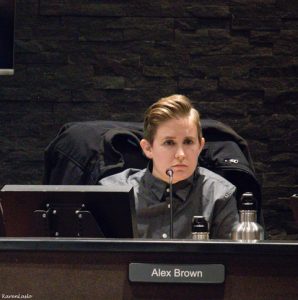
On Facebook pages where conservatives congregate, Brown has already sparked an almost hysterical reaction. Her proposal has been slapped with the “defund” label – even though it makes no mention of budget cutting. Conservatives are rallying Chicoans to email the Council in opposition. Citizens for a Safe Chico suggest purchasing an “I support Chico PD” T-shirt to get the campaign rolling.
“We’re hearing some disturbing efforts underway to convince the City Council to DEFUND our Police Department,” the group declares. “Just imagine the devastation this would cause…”
On Brown’s Facebook page, some of her supporters wish she would go further. Chico’s Eric Chisler says the proposal is a “good start,” but she should work to “drastically defund Chico PD.”
“We have our own George Floyd,” Chisler states, “dead now for over three years, and we have our own movement for justice, Justice for Desmond.”
Brown says her proposal is a beginning and Council will be acting today on what is only a preliminary spending plan that could be adjusted later. “This is not the be-all of reform,” Brown said in a phone interview.
Previous councils that viewed policing as a top priority worked to build up Chico PD, and its budget grew over past years. “That’s where the attention has gone at the expense of other programs,” Brown observed.
Brown wants Chico PD to use the funding it will receive in the coming fiscal year to build up de-escalation and crisis intervention training, using programs that have a track record of success. In the past, Chief Michael O’Brien, who retired last week, has indicated he doesn’t have the resources to increase officer training, she noted.
“That response is no longer acceptable,” she said. “This training can only benefit the police force and the community. Make it a priority.”
Chico’s Concerned Citizens for Justice (CC4J) is pushing for these kinds of measures. Both CC4J and Justice for Desmond say the Chico PD’s use-of-force policy needs to come swiftly into compliance with a state law that took effect in January.
“Our use of force policy is out of compliance with state law and community values,” CC4J’s Margaret Swick recently told city leaders at a private meeting. “It does not encourage or require de-escalation. It continues to state that officers may use the carotid control hold…”
Reform not a cure
People often initially think the defund police movement sounds wacky. Who would you call when there’s a robbery, rape or assault, they ask. But in the movement, advocates argue that only a small percentage of police time is devoted to violent crime.
USC Professor Jody Armour, speaking last week during an Ethnic Media Services briefing, says defunding may in fact be a better option than reform.
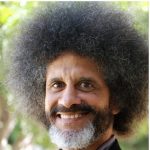
Armour, a law professor at the University of Southern California who specializes in race issues, says that for many years – at least since the 2014 police killing of Michael Brown in Ferguson, Mo. — we’ve been in a “wash, rinse, repeat cycle.”
After every incident, Armour says, we convene commissions, hold public hearings, vent anger and frustration. Then, he says, come reforms: Interventions like body cameras, implicit bias and de-escalation training, community policing. Minneapolis Police Department adopted those reforms when they were new concepts, he told reporters. And they didn’t prevent the killing of George Floyd and seemingly didn’t affect the behavior of three fellow officers who were involved or present.
“We’re coming to the realization that there’s not a way to tweak policy and fix this problem,” Armour told reporters. “We have to make deep slashes in the budgets of police departments. Then we address homelessness, health care, education, address income disparities.
“Focus police attention on solving murders, rapes, violent assaults. You can reduce the police presence without reducing public safety.”
Armour says Americans are facing a deeper problem that goes beyond policing. “We have to address structural racism. It also has to do with our hearts and minds. Black lives just don’t matter is the bottom line.”
Janet Goodson, interim president of the Butte County NAACP chapter that is pushing for police reform, would likely agree with some of what Armour says. “We are DONE DYING,” Goodson said in a written statement to ChicoSol.
“We are tired of black lives being murdered by police who use excessive force and who then seek sanctuary and hide behind the Blueline Code.”
Threats, anxiety, in response to protesting
As groups in Butte County prepared to respond to the killing of George Floyd and the national movement sweeping the country, not surprisingly there have been differences of opinion in how and when to protest – should you include police? — and how to achieve what Daniel, the student, calls a “whole overhaul.”
Rain Scher, a Justice for Desmond spokesperson, became worried when they saw the chatter on conservative Facebook pages last week. On pages like One Chico, users stewed over the possibility of rioting and what citizens could do to assist police. Justice for Desmond eventually cancelled plans to protest after Scher was notified that armed militia group members from out of town might come.
“We had safety concerns,” Scher said. “There were numerous various threats of violence from various sources. We were not prepared to keep people safe.
“As a general policy we do not organize with the police,” she added, in reference to one or two local events that that included law enforcement participation.
But protesters gathered almost spontaneously at the plaza for several days in a row as a steady stream of video appeared on national media and Twitter that showed cops wading into peaceful crowds, beating protesters with batons, firing tear gas and rubber bullets.

Pastor Vince Haynie
Pastor Vince Haynie and Chico’s Donell Thomas organized the Friday rally in a matter of three days. It was Chief O’Brien’s last day on the job, and the chief called Haynie and asked to speak to the crowd that would be assembled in the plaza. Haynie said that because of simmering resentment over the Desmond Phillips case, that wasn’t a good idea.
O’Brien said OK, his officers would “back off and stay in the wings.”
The rally proceeded without incident without a police presence. As people left that night, Haynie attempted to speak to one of the men who had been perusing the perimeter of the plaza, a man wearing an NRA tee. Haynie said he got no response.
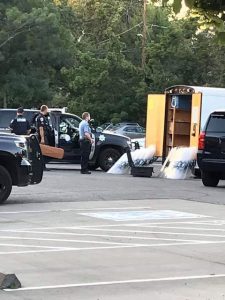
What does he think about defunding the police? Haynie seemed uncertain what that meant in practical terms, in cases where they might be needed.
“My goal is to change the culture of policing here in Butte County,” Haynie said. “We’re going to have to be changing hearts first, but holding officers accountable, using more de-esclation. I think this is bigger than what we think — violence and racism in law enforcement.”

Black Lives Matter only creates silos. this sets up the police reform movement to fail. the movement will fall victim to the organized opposition’s divide & conquer strategy. to be successful the police reform movement must have a intersectional make up & identity.
it may not be racism alone which we are confronting but the demonizing of the black man for the purpose of growing police budgets. it’s like reefer madness created by J Edgar Hoover only now it’s black man madness. because of the black man madness myth in the public safety culture, when a black man is accosted or even worse
a black man is shot. the public safety madness culture assumes the police are right & the black man had it coming.
the end result of this cultural situation is it the myth is perpetuated & the police are afforded the opportunity to increase their budgets with out restraints. I have tried to obtain a line item copy of the CPD budget, only to be denied with the caveat to be told we don’t touch the chiefs budget.
there’s nothing like fear to convince the public safety culture to empty their wallets for more pseudo police protection. the CPD has managed to do this to the tune of 50% of Chico’s budget, the very budget the CPD keeps secret from the citizens.
the black man madness myth is perpetuated & police budgets grow.
another myth which is being perpetuated here locally is “defunding” the CPD.
we are in reality talking about directing funds to crime preventive solutions such as Catalyst, Behavioral Health, Adverse Childhood Experiences programs, a detox center, etc.
police are not the solution to social problems.
.
This opinion lacks facts and is based purely on emotion. Chico Pd does not have a history of abuse towards any minority group as noted by their use of force statistics. Their policy is already in alignment with SB 392 as required by state law and adheres to Graham v. Conner which was a 1989 Supreme Court decision. Furthermore Desmond Phillips was a justified use of force and has already been cleared in local and federal courts. Any reasonable person who actually reviewed this case would have also deemed the use of force justified.